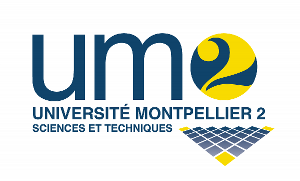Oenology is the science and study of wine and winemaking. Oenology is distinct from viticulture, which is the science of the growing, cultivation, and harvesting of grapes. The English word oenology derives from the Greek word oinos "wine" and the suffix –logia the "study of". An oenologist is an expert in the science of wine and of the arts and techniques for making wine.
The École Nationale Supérieure des Industries Agricoles et Alimentaires, or ENSIA, was a French grande école of agriculture, located in Massy, near Paris. It was affiliated to the Ministry of Agriculture. The school was founded in 1893 and merged into AgroParisTech in 2006.

Montpellier 2 University was a French university in the académie of Montpellier. It was one of the three universities formed in 1970 from the original University of Montpellier. Its main campus neighbors the Montpellier 3 University's main campus, and for this reason the nearest tramway station is named "Universities of Sciences and Literature" rather than "University of Sciences". In January 2015, Montpellier 1 University and Montpellier 2 University merged into the Montpellier University.
The Institut Agro Dijon is a French grande école located in Dijon, France. The institute specialises in agriculture, food science and environmental science.

The École nationale supérieure agronomique de Rennes is a french engineering school specializing in agronomy and the agri-food industry. The school exists from XIXth century. In 2004 the name of the school became Agrocampus Rennes. Then, the school joined the Angers National horticultural institute to form Agrocampus Ouest in 2008. Since 2020, Agrocampus Ouest has been an part of the Agro Institute, in the same way as the Montpellier school and the Dijon school. In 2022, the school becomes the Institut Agro Rennes-Angers.

Gembloux Agro-Bio Tech (GxABT), located in Gembloux, Belgium, is one of the eleven faculties of the University of Liège. Founded in 1860 and previously known as the Faculté universitaire des sciences agronomiques de Gembloux, it is Belgium's oldest educational and research institution dedicated to agronomic sciences and biological engineering. It is the only school in Belgium to be accredited by the French Commission des Titres d'Ingénieur allowing the university to deliver the Diplôme d'Ingénieur engineering degree. The school is also accredited by the EUR-ACE label, the highest European quality label for engineering degree programmes at Bachelor and Master level.
AgroParisTech is a French higher education institution, known as a grande école. It is a constituent member of the Paris-Saclay University. It was founded on January 1, 2007, by the merger of three life sciences grandes écoles.

Sokoine University of Agriculture (SUA) is a public university in Morogoro, Tanzania, specializing in agriculture. The university is named after the country's second prime minister Edward Sokoine.

The Federal University of Pampa is a public university established in 2006 in the Southern region of the state of Rio Grande do Sul.

The Institut national de la recherche agronomique was a French public research institute dedicated to agricultural science. It was founded in 1946 and is a Public Scientific and Technical Research Establishment under the joint authority of the Ministries of Research and Agriculture. From 1 January 2020 the INRA merged with the IRSTEA to create the INRAE.
Agropolis International, formerly called Agropolis, is an association that was founded in 1986 by Louis Malassis and research and higher education institutes.
The School of Agricultural and Life Sciences is a French public and national Grande Ecole in agricultural and life sciences, funded by the Ministry of Higher Education and Research and member of Toulouse Tech. The ENSAT is a school of the National Polytechnic Institute of Toulouse (INPT), a university federating several schools dealing with engineering, agriculture and veterinary sciences, chemistry, meteorology.

Vietnam National University of Agriculture, until 2014 Hanoi University of Agriculture (HUA), is an education and research university specializing in the agricultural sector. The university is located in Trau Quy town, Gia Lam district, a Hanoi suburban area, about 12 km far from Hanoi city centre.
The Faculty of Land and Food Systems (LFS) is one of the three founding Faculties at the University of British Columbia (UBC) in Vancouver, British Columbia, Canada.

Institut Agro Rennes-Angers is a French higher education institution, known as a grande école. Its official name is Institut supérieur des sciences agronomiques, agroalimentaires, horticoles et du paysage. It operates under the supervision of the French Ministry of Agriculture. It belongs to the Institut Agro, along with Institut agro Montpellier and Institut Agro Dijon.

VetAgro Sup is a French engineering college created in 2010.

Henri Stehlé was a French agronomist, botanist and ecologist specialized in tropical agriculture. In 1949 he founded the Agronomic Research Center of INRA Antilles-Guyane in Guadeloupe, of which he was Director until 1964. As botanist he worked mainly in Guadeloupe and Martinique in collaboration with his wife, Madeleine Stehlé, and Reverend Father Louis Quentin. Stehlé focused his work on two plant families: Orchidaceae and Piperaceae. The abbreviation Stehlé is used to indicate Henry Stehlé as the authority for many plant names.

The Institut Agro or National Institute of Higher Education for Agriculture, Food and the Environment is a french public scientific, cultural and professional establishment (EPSCP), a Grands établissements created on January 1, 2020.










